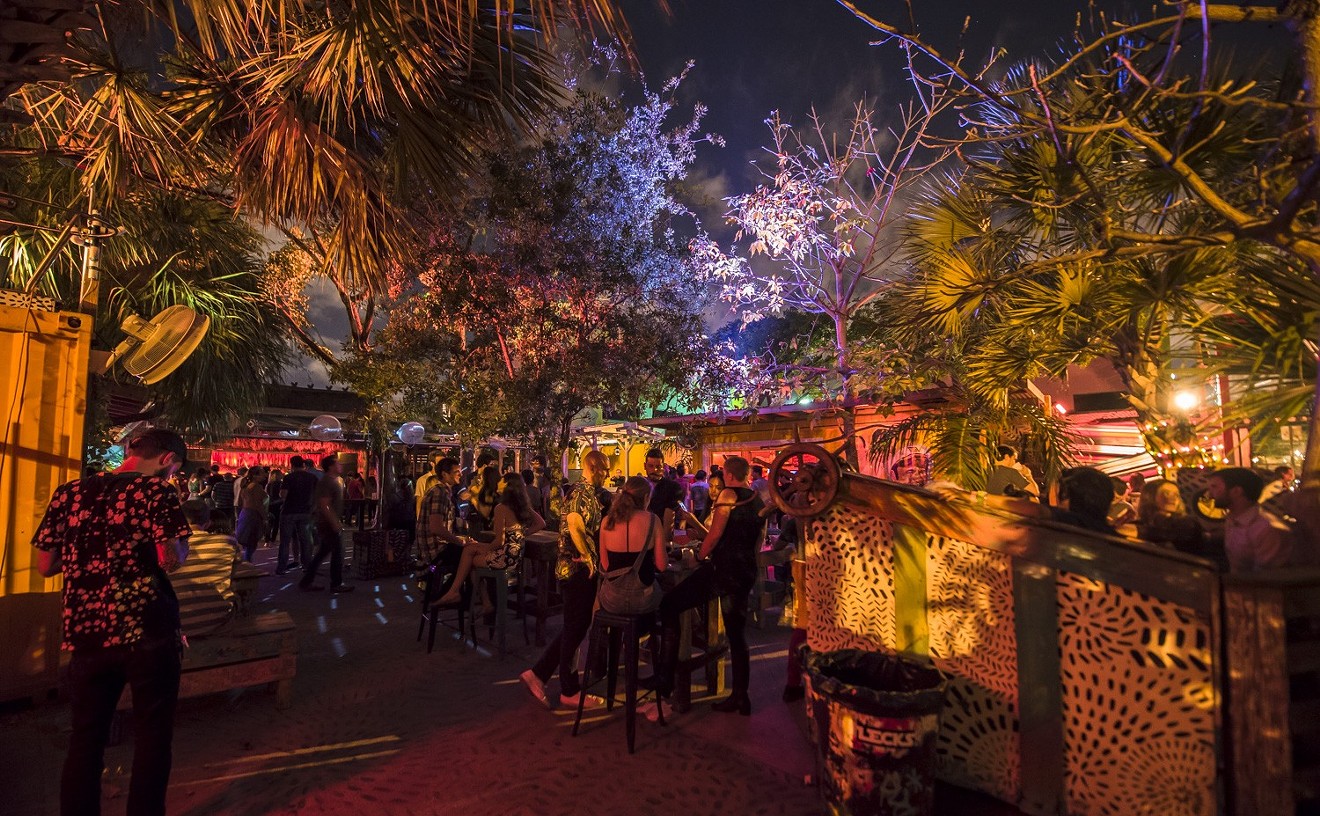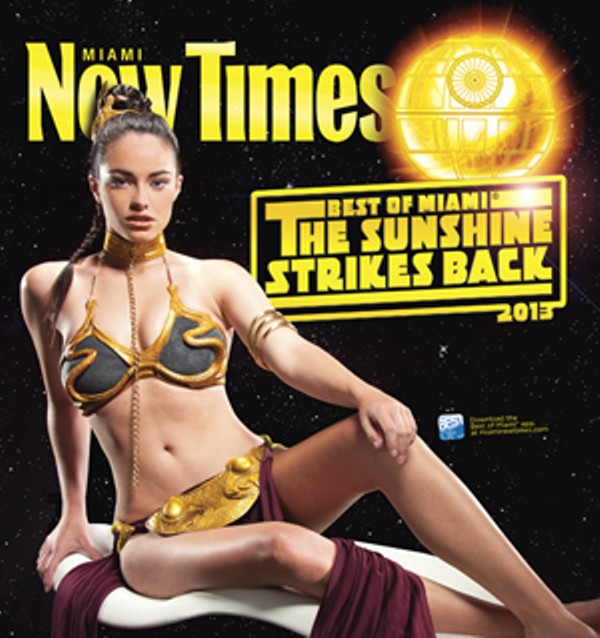The Voice continues to grow louder. What began as a pirate radio station in 1967 has become one of the most powerful college radio stations in the nation. And we mean "powerful" quite literally. Last fall, WVUM, the University of Miami's student-run station, underwent a massive signal boost, which means listeners can tune in from up to 30 miles away from the Coral Gables transmitter. That upgrade doubled the station's reach, and it can now be heard as far north as Fort Lauderdale. Watt quantity is nothing without quality, though, and WVUM remains on the cutting edge. Sure, new students filter through every year, putting their own unique stamp on the station, but for more than a decade the Voice has favored an eclectic playlist that embraces everything from folk to electronic to world. It's a station that kicked the stereotype that college radio plays only forlorn indie rock. The staff's eclectic music taste fittingly remains as diverse as the community it serves.
Best Recording Studio
Audio Vision Studios
The walls at Audio Vision Studios are pure gold and platinum. Owned and operated by brothers Ron and Howard Albert, along with TK Records alum Steve Alaimo, this North Miami operation and the dozens of hit records, framed and hanging in the lobby, are monuments to Miami music history. Throughout the '60s and '70s, Ron and Howard, longtime local studio pros who were recently inducted into the Florida Music Hall of Fame, were chief engineers at Mack Emerman's legendary Criteria Recording Studios, shaping songs and albums by the Rolling Stones, the Allman Brothers Band, Eric Clapton, the Bee Gees, Barbra Streisand, Kenny Rogers, Dionne Warwick, Dolly Parton, and Crosby, Stills & Nash. Meanwhile, Alaimo was holed up at TK's Hialeah shop, producing and polishing the funky disco and smooth soul sounds of KC & the Sunshine Band, Betty Wright, George McCrae, and Bobby Caldwell. And now, 40 years later, Ron, Howard, and Steve share Audio Vision, where superstar clients such as Lil Wayne and other local hip-hop heavies cut Top 40 rap tracks. "I think we have 40 gold records to our name," Howard once told New Times, "and about 30 or so platinum." Of course, there's always room for another dozen.
- 13385 W. Dixie Highway, North Miami, 33161 Map
- 305-893-9191
- www.audiovisionstudios.com
Best Record Label
Mr. Nice Guy Records
With an ever-thickening catalogue of raw offerings from Leroy "Big L" Brown, Sex Sells, S.K.A.M., Sishi Rösch, and a bunch of other hard-core party boys, this 305 label is all about that deep and dirty booty-tronic sound. Run by filthy EDM genius Jesse Perez (AKA the musical mind behind "Dejen de Comer Tanta Pinga," "We Get Fucked Up," and "Interracial Booty Calls"), Mr. Nice Guy Records has a simple priority: ass-clapping! "Been grinding on all types of females since I was 5," Jesse once told New Times. "I used to get thrown out of United Way school dances for dry humping." But even if the track titles and related come-ons are raunchy as hell, Perez and his crew's stroke is smooth and sophisticated. "I just look for real talent, no phonies," Jesse says. "We push a very distinct sound from what everyone else is doing. Some call it hood house or gangsta house. I refer to it as ass-clapping music or bump 'n' grind." It's sticky. It's stanky. It's real. Or in the words of the boss: "No hype, no all-American smiles. Just talent and dick length."
Best Music Blog
Jolt Radio
Traditional radio is boring and predictable. Your music-discovery engine needs a swift kick in the ass — a jolt even. Just turn off that old FM receiver and plug into the constant stream of melody on JoltRadio.org. Playing the best in local, national, and international jams, this is homegrown internet radio you can enjoy all over the world. It drops indie, dance, classics, hits, and anything with a progressive sound. Tune in and you'll catch anything from !!! to the Shins, Grimes to the Magnetic Fields. Even though an internet base makes Jolt global, it represents the 305 in everything it does. Its website offers an in-depth look at all of Miami's happening bands, producers, and musicians, plus a calendar of events cataloguing the best live music in town. You can even stay up to date with artist-of-the-month spotlights. Give Clear Channel a rest; it's making plenty of cash without your car radio. Get involved with your city and your community instead — all by listening to some great tunes.
Best Nightlife Impresario
David Grutman

How can anyone fill an 18,000-square-foot club night after night after night? Ask David Grutman, the man behind Miami Marketing Group (MMG). After cutting his teeth at Tantra and the Opium Group, Grutman started MMG and later launched the Fontainebleau's LIV in 2008, creating one of the most talked-about and hard-to-access nightclubs far from the pulsating heart of South Beach. But when you have the iconic Fontainebleau as your home, it's not exactly difficult to draw the well-heeled clientele needed to sustain such a massive space. To prove he wasn't a fluke, Grutman partnered with the Fontainebleau for its second nightlife space, Arkadia, and then launched Oro Nightclub at the Hard Rock Hotel in Punta Cana, Dominican Republic. But his biggest success to date might be Story (136 Collins Ave., Miami Beach), which is located in a troublesome spot that's seen many endeavors come and go. So far, at least, it seems to be a runaway success, borrowing cues from downtown Miami's nightlife (more relaxed door policy, riskier bookings, more dance-music-oriented) along with South Beach staples (bottle service, beautiful girls, and elegant décor). What's next for Grutman? Who knows. Whatever it is, put your money on a hit.
- 4441 Collins Ave., Miami Beach, 33140 Map
- 305-674-4680
- livnightclub.com
Best Electronica Artists
Metro Zu
Metro Zu has a message for the galaxies, and it's available on all of their 39 — yes, thirty-nine — wildly experimental albums: Art over everything. Between Lofty305, Ruben Slikk, Freebase, Mr. B the Poshtronaut, and a universal gang of allies, the Zu collective has generated a rapidly accelerating interest in the sound of young Miami by reaching out and making fans through the cyberwebs and through touring the world's capitals in physical reality. Just because they rhyme words over beats doesn't make their music rap. And just because the music is electronic doesn't mean they're robots. By surfing the collective consciousness of wholly improvised lyrics on an ocean's worth of ever-shifting beats, they're creating a tsunami of musical energy that's just about to crash ashore.
Best DJ
BAEZ
It's a tough racket being a DJ in Miami. In a nightlife capital that moves to that uhntz-uhntz beat 24/7, there's bound to be a constant surplus of hungry wannabes fighting over gigs for their measly share of the limelight. Only genuine talent, hard work, and dedication set apart the pros. Take Miami clubland mainstay Jason Baez, known professionally as BAEZ. After patiently and diligently working his way up in the competitive local scene since the late 2000s, BAEZ has emerged as the go-to DJ for practically every promoter of underground house and techno nights in Miami. There are few DJ booths in town he hasn't graced, and he's opened for some of the biggest names in the game, including most recently Maceo Plex and Damian Lazarus at Club Mansion. There's also the matter of BAEZ's own Sub-Motus parties, which bring serious international bookings to Miami every month, and his budding work as a producer with releases on labels such as Wehppa and Deep Tech. In short, BAEZ has risen above the noise by being the hardest-working DJ in Miami, without ever compromising his commitment to pushing underground and cutting-edge dance music.
Best DJ Who Still Plays Vinyl
DJ Benton

Finding a DJ in Miami who still hauls a crate full of vinyl from gig to gig is as rare as stumbling across a mint-condition, lost '70s funk classic wedged under your grandma's couch. But there is one DJ who won't give into the ease of Traktor, Ableton, and other spinning software. DJ Benton, AKA Benton Galgay, has an insane encyclopedic knowledge of music that comes only when someone is whole-heartedly devoted to worshipping the cult of vinyl. He's spun everywhere, from Electric Pickle to Grand Central to Bardot, but currently calls Friday nights at Gramps home. From Kraftwerk to Talking Heads to the latest DFA release, Benton's mixture of the old and new always seems to be a crowd pleaser. And while there are plenty of other DJs in the city with name recognition and aspirations of a Skrillex-level career, Benton seems perfectly content to DJ as an exercise in musical education for those within earshot. If you wander into Gramps and can't find him, don't worry: He probably just disappeared behind the decks for a moment to rummage through his crate.
- 176 NW 24th St., Miami, 33127 Map
- 855-732-8992
- gramps.com
Best Vinyl Store
Red White & Blue Thrift Store
Yes, Red White & Blue is a thrift shop not a record shop. That's doesn't stop it from stocking a constantly evolving, always surprising music selection for a variety of tastes. Whether there's a secret High Fidelity-esque character manning the shop's record section or it's just pure chance, Red White & Blue's vinyl seems carefully curated. You'll find everything from great jazz to rock records, and these aren't your run-of-the-mill million-sellers of the '70s and '80s or dead people's detritus from the '50s and '60s. You might just find early Stones, Beatles, and Doors albums or a rare piece of vinyl from the '90s. If you're really lucky, you'll stumble upon near-mint copies that only need a good cleaning for a pristine sound. Plus, the average price of an album is $2, though some sought-after records can go for as much as $4. That still beats $20 at a record shop. Store personnel use a permanent marker to price the records, but it's a small knock in value for the price you'll pay for quality vinyl (cash only, please). A new stack of records appears at least once a week, if not more often. (Keep this on the down-low: If you visit around 3:30 p.m., you'll be first to the prime-time restocks.) Plenty of commercial dealers and serious collectors swing by Red White & Blue to raid the vinyl (sorry, guys, the secret is out), so be prepared to throw some 'bows for those primo picks.
Best Live Music Venue
Grand Central

Remember the tail end of the 2000s, back when Miami was clamoring for any midsize live music venue to open? Really, when we didn't have a single one and had to drive to Fort Lauderdale for our indie music fix? Even in those dark days, we couldn't have imagined how profoundly downtown's Grand Central would answer our prayers. Grand Central has committed itself not only to showcasing live acts that would have never even considered Miami as a stop on their U.S. tours five years ago, but also to providing a common ground for our unique homegrown melting pot of musical tastes. The international talent gracing Grand Central's stage has included everything from indie Latin showstoppers like Los Amigos Invisibles to '80s legends like A Flock of Seagulls and hip-hop biggies like Cypress Hill. But perhaps most important, the venue continues to provide our hard-knock local musicians with a much-needed launching pad for the exposure they simply won't find anywhere else in town. Welcome to the future, Miami music-heads — thanks to Grand Central, it looks a hell of a lot better than the past.
- 697 N. Miami Ave., Miami, 33136 Map
- 305-377-2277
- www.grandcentralmiami.com





